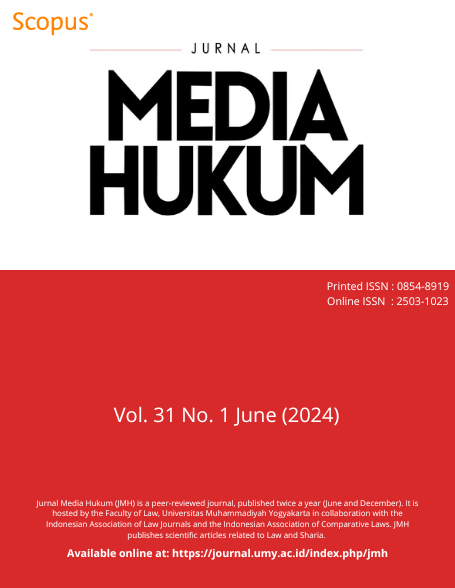Preventing Electoral Fraud in Indonesia: Protecting the Social Security of Election Management Personnel
DOI:
https://doi.org/10.18196/jmh.v31i1.19361Keywords:
Election Fraud, EMB’s, Prevent, Right, Social SecurityAbstract
Indonesia’s Election Management Bodies (EMBs), constitutionally mandated to manage legislative and presidential elections, face substantial risks, including accidents and fatalities. However, their social security rights are often overshadowed by the focus on civil servants and private-sector workers. This study, employing normative legal research, urges the need for state protection of EMBs’ social security rights, drawing on secondary data sources. EMBs should receive comprehensive work-related accident benefits, death benefit programs, and old-age protection schemes from the Workers Social Security Agency (BPJS Ketenagakerjaan). The legal basis for these social security rights can be found in several legislative provisions, including the Indonesian 1945 Constitution, the National Social Security System Law, and other related regulations. Recognizing EMBs as state-serving workers is a crucial step in safeguarding their social security rights. This recognition is not merely a matter of legal interpretation; it is a necessity to ensure a fair and secure electoral environment. By ensuring that EMBs are accorded the same rights and protections as other workers, the state can create a more equitable electoral process and reinforce the integrity of its democratic institutions.References
Aminuddin, M. Faishal, ‘Electoral System and Party Dimension Assessment in Democratic Indonesia’, Jurnal Ilmu Sosial Dan Ilmu Politik, 20.1 (2017), 1. https://doi.org/10.22146/jsp.17956.
Arimbi, Diah, ‘Legal Status of The Social Security Administrator (BPJS) As A Public Legal Entity’, Jurnal Dinamika Hukum, 19.3 (2020), 829. https://doi.org/10.20884/1.jdh.2019.19.3.2700.
Arumbinang, Mohammad Hazyar, Yordan Gunawan, and Andi Agus Salim, ‘Prohibition of Child Recruitment as Soldiers: An International Regulatory Discourse’, Jurnal Media Hukum, 30.1 (2023), 21–32. https://doi.org/10.18196/jmh.v30i1.19322.
Barzegar, Keihan, and Fatemeh Sarreshteh Izadmoosa, ‘The Right to Social Security in International Documents’, Jurdical Tribune Journal, 7.1 (2017), 39–52. https://doi.org/10.1177/0022343319889657.
Berenschot, Ward, and Peter Mulder, ‘Explaining Regional Variation in Local Governance: Clientelism and State-Dependency in Indonesia’, World Development, 122 (2019), 233–44. https://doi.org/10.1016/j.worlddev.2019.05.021.
Bhat, M. Mohsin Alam, ‘Governing Democracy Outside the Law: India’s Election Commission and The Challenge of Accountability’, Asian Journal of Comparative Law, 16.S1 (2021), S85–104. https://doi.org/10.1017/asjcl.2021.30.
Brañas-Garza, Pablo, María Paz Espinosa, and Ayca E. Giritligil, ‘On the Transmission of Democratic Values’, Journal of Economic Behavior & Organization, 200 (2022), 885–96. https://doi.org/10.1016/j.jebo.2022.06.036.
Carolien van Ham and Holly Ann Garnett, ‘Building Impartial Electoral Management? Institutional Design, Independence and Electoral Integrity’, International Political Science Review, 40.3 (2019), 313–34. https://doi.org/10.1177/0192512119834573
Dettman, Sebastian, Thomas B. Pepinsky, and Jan H. Pierskalla, ‘Incumbency Advantage and Candidate Characteristics in Open-List Proportional Representation Systems: Evidence from Indonesia’, Electoral Studies, 48 (2017), 111–20. https://doi.org/10.1016/j.electstud.2017.06.002.
Dimyati, Khudzaifah, Haedar Nashir, Elviandri Elviandri, Absori Absori, Kelik Wardiono, and Arief Budiono, ‘Indonesia As a Legal Welfare State: A Prophetic-Transcendental Basis’, Heliyon, 7.8 (2021), e07865. https://doi.org/10.1016/j.heliyon.2021.e07865.
Fombad, Charles Manga, ‘Election Management Bodies (EMBs) in Eastern and Southern Africa: Some Reflections on Their Legal Framework’, African and Asian Studies, 15.2–3 (2016), 289–335. https://doi.org/10.1163/15692108-12341365.
Fossati, Diego, Edward Aspinall, Burhanuddin Muhtadi, and Eve Warburton, ‘Ideological Representation in Clientelistic Democracies: The Indonesian Case’, Electoral Studies, 63 (2020), 102111. https://doi.org/10.1016/j.electstud.2019.102111.
Garnett, Holly Ann, and Toby S. James, ‘Electoral Backsliding? Democratic Divergence and Trajectories in The Quality of Elections Worldwide’, Electoral Studies, 86 (2023), 102696. https://doi.org/10.1016/j.electstud.2023.102696.
Gunawan, Yordan, ‘Arbitration Award of ICSID on the Investment Disputes of Churchill Mining PLC v. Republic of Indonesia’, Hasanuddin Law Review, 3.1 (2017), 14–26. https://doi.org/10.20956/halrev.v3i1.948.
Gunawan, Yordan, M. Fabian Akbar, and Eva Ferrer Corral, ‘WTO Trade War Resolution for Japan’s Chemical Export Restrictions to South Korea’, Padjadjaran Jurnal Ilmu Hukum, 9.3 (2022), 408–31. https://doi.org/10.22304/pjih.v9n3.a6
Gunawan, Yordan, Muhamad Haris Aulawi, Rizaldy Anggriawan, and Tri Anggoro Putro, ‘Command Responsibility Of Autonomous Weapons Under International Humanitarian Law’, Cogent Social Sciences, 8.1 (2022), 1–16. https://doi.org/0.1080/23311886.2022.2139906.
Gunawan, Yordan, Yasir Perdana Ritonga, Mita Amelia, Siti Septiana K. Harun, and Nisa Nurhofipah Ramadani, ‘Does the Protection of Minority Groups in Xinjiang Fail?’, Sriwijaya Law Review, 4.2 (2020), 205–20. https://doi.org/10.28946/slrev.Vol4.Iss2.432.pp205-220.
Hadini, Mutia, and Lanny Ramli, ‘Benefits of Employment Social Security Agency for Foreign Workers in Indonesia’, PalArch’s Journal of Archaeology of Egypt / Egyptology, 17.3 (2020), 1723–30. https://doi.org/ 10.1088/1755-1315/175/1/012128.
Harakan, Ahmad, Riccardo Pelizzo, and Nygmetzhan Kuzenbayev, ‘Traditional Beliefs and Electoral Behavior in Indonesia’, World Affairs, 186.4 (2023), 896–924. https://doi.org/10.1177/00438200231203005.
Haryadi, Trapsi, and Suswanta Suswanta, ‘Implementation of Enforcement of the Integrity of Ad hoc Election Organizers in the 2020 Sleman Regent and Deputy Regent Elections’, Politik Indonesia: Indonesian Political Science Review, 7.3 (2022), 408–24. https://doi.org/10.15294/ipsr.v7i3.39870.
Hendrianto, Stefanus, ‘Constitutionalized but Not Constitute: The Case of Right to Social Security in Indonesia’, Constitutional Review, 6.2 (2020), 241. https://doi.org/10.31078/consrev623.
Heniyatun, Heniyatun, Retno Rusdjijati, and Puji Sulistyaningsih, ‘Protection of Informal Workers as Participants Through the Magelang Regional Social Security System’, Varia Justicia, 14.2 (2018), 78–86. https://doi.org/10.31603/variajusticia.v14i2.2379.
Iqbal, Muhammad, ‘Integritas Penyelenggara Pemilu Adhoc, Praktik Electoral Fraud Oleh Panitia Pemilihan di Provinsi Sumatera Utara’, Electoral Governance Jurnal Tata Kelola Pemilu Indonesia, 1.2 (2020), 1–22. https://doi.org/10.46874/tkp.v1i2.69.
James, Toby S, ‘Better Workers, Better Elections? Electoral Management Body Workforces and Electoral Integrity Worldwide’, International Political Science Review, 40.3 (2019), 370–90. https://doi.org/10.1177/0192512119829516.
James, Toby S, Holly Ann Garnett, Leontine Loeber, and Carolien Van Ham, ‘Electoral Management and The Organisational Determinants of Electoral Integrity: Introduction’, International Political Science Review, 40.3 (2019), 295–312.https://doi.org/10.1177/0192512119828206.
Katju, Manjari, ‘Institutional Initiatives Towards Expanding Democracy: The Election Commission of India and Electoral Mobilisation’, Contemporary South Asia, 29.2 (2021), 147–61. https://doi.org/10.1080/09584935.2020.1775179.
Kelliher, Camden, Saldi Isra, Yuliandri, Zainul Daulay, Hilaire Tegnan, and Feri Amsari, ‘Unconstitutional Authority of Indonesia’s Constitutional Court: The Resolution of Pilkada Result Disputes’, Election Law Journal: Rules, Politics, and Policy, 18.3 (2019), 297–308. https://doi.org/10.1089/elj.2018.0535.
Kildea, Paul, ‘The Constitutional Role of Electoral Management Bodies: The Case of The Australian Electoral Commission’, Federal Law Review, 48.4 (2020), 469–82. https://doi.org/10.1177/0067205X20955097.
Kusdarini, Eny, Anang Priyanto, Sri Hartini, and Suripno Suripno, ‘Roles of Justice Courts: Settlement of General Election Administrative Disputes in Indonesia’, Heliyon, 8.12 (2022), e11932. https://doi.org/10.1016/j.heliyon.2022.e11932.
Kusdarini, Eny, Sunarso Sunarso, Suharno Suharno, and Nasiwan Nasiwan, ‘Addressing Challenges in Simultaneous Implementation of Regional Head Elections During The Covid-19 Pandemic’, Jurnal Civics: Media Kajian Kewarganegaraan, 20.1 (2023), 189–96. https://doi.org/10.21831/jc.v20i1.60128.
Laksono, Fajar, Sudarsono Sudarsono, Arief Hidayat, and Muchammad Ali Safaat, ‘Relation Between the Constitutional Court of The Republic of Indonesia and The Legislators According to the 1945 Constitution of The Republic of Indonesia’, Constitutional Review, 3.2 (2018), 141. https://doi.org/10.31078/consrev321.
Langford, Malcolm, Rebecca Schiel, and Bruce M. Wilson, ‘The Rise of Electoral Management Bodies: Diffusion and Effects’, Asian Journal of Comparative Law, 16.S1 (2021), S60–84. https://doi.org/10.1017/asjcl.2021.29.
Lundstedt, Martin, and Amanda B. Edgell, ‘Electoral Management and Vote-Buying’, Electoral Studies, 79 (2022), 102521. https://doi.org/10.1016/j.electstud.2022.102521.
Lundstedt, Martin, and Amanda B. Edgell, ‘Institutions of Electoral Integrity and Clientelism: The Role of Electoral Management Bodies’, SSRN Electronic Journal, 2020. https://doi.org/10.2139/ssrn.3697281.
Mark Tushnet, ‘Institutions for Protecting Constitutional Democracy: An Analytic Framework, with Special Reference to Electoral Management Bodies’, Asian Journal of Comparative Law, 16.S1 (2021), 10–22. https://doi.org/10.1017/asjcl.2021.27.
Ministry of National Development Planning, and Dharendra Wardhana, ‘Decentralization, Democratization, And Social Protection In Indonesia: A Systematic Review of the Literature’, Jurnal Perencanaan Pembangunan: The Indonesian Journal of Development Planning, 3.2 (2019). https://doi.org/10.36574/jpp.v3i2.73.
Muhamad Hasan Muaziz, ‘Analysis of Investment Management Law at The Employment Social Security Organizing Agency (BPJS)’, Al Wasath Jurnal Ilmu Hukum, 3.1 (2022), 13–26. https://doi.org/10.47776/alwasath.v3i1.330.
Muhamad Haris Aulawi, Yordan Gunawan, M. Hanaan Alfarizi, Manuel Campos Lago, ‘Governing Indonesia’s Plan to Halt Bauxite Ore Exports: Is Indonesia Ready to Fight Lawsuit at the WTO?’, Bestuur, 11.1 (2023), 26–42. https://doi.org/10.20961/bestuur.v11i1.69178.
Noor, Firman, Sarah Nuraini Siregar, Ridho Imawan Hanafi, and David Sepriwasa, ‘The Implementation of Direct Local Election (Pilkada) and Money Politics Tendencies: The Current Indonesian Case’, Politik Indonesia: Indonesian Political Science Review, 6.2 (2021), 227–46. https://doi.org/10.15294/ipsr.v6i2.31438.
Nygård, Håvard Mokleiv, ‘Timing Matters: The Impact of Regularity of Election Cycles on Autocratic Stability’, Electoral Studies, 66 (2020), 102167. https://doi.org/10.1016/j.electstud.2020.102167.
Pambudi, Luhur Sanitya, ‘Bagi Pekerja Bukan Penerima Upah di Wilayah Kota Semarang Ditinjau Dari Permenaker Nomor 1 Tahun 2016’, Indonesian State Law Review (ISLRev), 1.2 (2019), 205–28. https://doi.org/10.15294/islrev.v1i2.38439.
Rafi’i, Muhammad, and Zaid Zaid, ‘Building Social Welfare Through Social Security Based on The Socio-Economic Justice During Covid-19 Pandemic Crisis’, Jurnal Sosial Humaniora, 14.2 (2021), 138. https://doi.org/10.12962/j24433527.v14i2.9477.
Ruiz-Rufino, Rubén, and Sarah Birch, ‘The Effect of Alternation in Power on Electoral Intimidation in Democratizing Regimes’, Journal of Peace Research, 57.1 (2020), 126–39. https://doi.org/10.1177/0022343319885171.
Serra, Gilles, ‘Vote Buying with Illegal Resources: Manifestation of a Weak Rule of Law in Mexico’, Journal of Politics in Latin America, 8.1 (2016), 129–50. https://doi.org/10.1177/1866802X1600800105.
Tarverdi, Yashar, Shrabani Saha, and Neil Campbell, ‘Governance, Democracy and Development’, Economic Analysis and Policy, 63 (2019), 220–33. https://doi.org/10.1016/j.eap.2019.06.005.
Toha, Risa J., Dimitar D. Gueorguiev, and Aim Sinpeng, ‘The Normalization of Intolerance: The 2019 Presidential Election in Indonesia’, Electoral Studies, 74.2 (2021), 102391. https://doi.org/10.1016/j.electstud.2021.102391.
Tunçer, Ali Coşkun, and Leonardo Weller, ‘Democracy, Autocracy, and Sovereign Debt: How Polity Influenced Country Risk on the Peripheries of The Global Economy, 1870–1913’, Explorations in Economic History, 85 (2022), 101449. https://doi.org/10.1016/j.eeh.2022.101449.
Wiryawan, I Wayan Gde, ‘The Protection of Social Workers in The Perspective of The Principles of Humanity and Justice’, International Journal of Law Reconstruction, 6.2 (2022), 185. https://doi.org/10.26532/ijlr.v6i2.24686.










